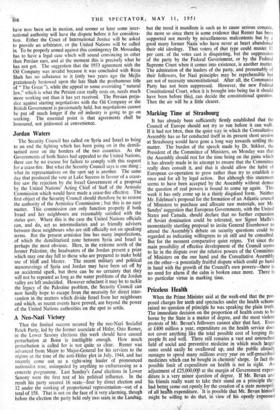Marking Time at Strasbourg
It has already been sufficiently firmly established that the Council of Europe should not try to run before it can walk. If it had not been, then the quiet way in which the Consultative Assembly has so far conducted itself in its present short session at Strasbourg would have gone a long way towards settling the matter. The burden of the speech made by Dr. Stikker, the President of the Committee of Ministers, on Monday was that the Assembly should rest for the time being on the gains which it has already made in its attempt to ensure that the Committee really does consult it, and that it should allow the habit of European co-operation to grow rather than try to establish it once and for all by legal action. But although this statement seems to have been accepted by the Assembly without demur the question of real powers is bound to come up again. This week it has only come up in a thinly disguised form. Neither Mr. Edelman's proposal for the formation of an Atlantic council of Ministers to purchase and allocate raw materials, nor Mr. Sand3,s' suggestion that Europeae Governments, with the United States and Canada, should declare that no further expansion of Soviet domination could be tolerated, nor Signor Malfa's momentarily startling proposal to invite General Eisenhower to attend the- Assembly's debate on security questions could be regarded as indicating willingness to sit still and be consulted. But for the moment comparative quiet reigns. Yet since the main possibility of effective development of the Council seems to lie in the dispute over the relative powers of the Committee of Ministers on the one hand and the Consultative Assembly on the other—a potentially fruitful dispute which could go hand in hand with the growth of the Council's own powers—there is no need for alarm if the calm is broken once more. There is no particular virtue in marking time.


































 Previous page
Previous page